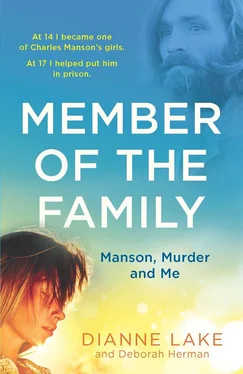Even more generously, this new couple set my father up with his own studio where he could paint and create, and placed us in a small house with a nice yard where we could live more comfortably. Kind as these actions were, they were also part of the patron’s role. Gallery owners were supposed to take diligent care of their artists. When word spread of their generosity, other artists would be enticed into joining their stable.
All of us loved our new little house, and once again it felt like home, but more important, it felt like home to my father, a place where he could pursue his art to his content. Gradually his fixation with moving to California abated, and life returned to some sort of normal. At least for a time.
With my dad occupied painting for his patrons, our family settled into a routine of sorts, and he threw himself into his work. He spent the days in his studio, which was filled with supplies, canvases, and a drafting table. It smelled like a combination of linseed oil, India ink, cigarette smoke, and creativity. He smiled and listened to jazz records while he worked
Christmas Day during my third-grade year, when we lived in this little house, was the best time I can remember ever having with my entire family. That morning I awoke to the smell of fresh cinnamon buns that my mother had made from scratch and raced Danny downstairs to see what was under the tree. Beside the presents from Grandma, Grandpa, and my parents that had been under the tree the night before, there was a new one. There it was in all its glory, the Barbie Dreamhouse I had wanted—a gift from Santa Claus.
I ripped through my other presents, opening gifts from my father’s parents from Milwaukee. Our only close family, they would be visiting us in the summer now that we were settled into a proper home. Finally, I got to a present that was marked To Dianne, from Dad . I tore into the package and couldn’t believe what was in it. My father had made a bed for my Barbie to fit into the house that Santa had sent me. On the verge of tears with excitement, I went to hug my dad; always a bit awkward at affection, he turned away, giving me a sideways hug.
Later that day, we had a Christmas dinner with some of my parents’ friends. My parents had settled into our new home, our new life, and had added new people. My father had collected a new crowd matching the life he was creating and his new persona as a professional artist. Around the table this year was an Ethiopian artist who wore a dashiki. The dark-skinned man chewed on toothpicks made of orange sticks and used them to clean his teeth. He told us about how in his country they did not use forks and knives when they ate. Instead, he explained, they used a special bread to scoop food into their mouths and into the mouths of others sharing the table. This Christmas meal would be strictly American, and he was looking forward to our traditions. My parents were also friends with a Ukrainian couple who joined us. They brought us pysanky as a gift and explained that they were typically for Easter. These were eggs decorated with Ukrainian folk designs. The wife promised to show me how the eggs were created during the holiday.
It was a remarkably special day, but sadly it was also one of the last of its kind. We never were that happy and secure again in Minnesota. Things always had a way of changing, especially in a family like mine.
My parents seemed content with their friends, but my mother encouraged us to keep in touch with my father’s parents as well. Sometimes I would hear them arguing about having them come visit us, with my mother insisting it was good for children to know their family and my father saying he didn’t need to see his parents. During the summer between first and second grade my grandparents had come out to visit us back in our big old house. It was a fun visit, and I’d enjoyed having them around, eating meals together and going places. I was proud when during dinnertime one evening, my father hung a portrait he had painted of me on the wall for everyone to see. My dad and grandpa worked on the car together and we all seemed to get along.
Still, in the aftermath of the visit, there seemed to be some residual tension between Grandpa and my father. It was obvious that my grandparents didn’t share my father’s interests, and that Grandpa in particular never liked my father’s desire to be an artist, looking down on him for it. The following summer we didn’t see my grandparents, and I don’t think my parents ever let them know that we had been living in a trailer park. But now that we were back in a real house and my father was becoming successful, my mother began encouraging him to contact them again.
“The children miss their grandparents, Clarence, we should invite them out.”
“I’m too busy to take the time with them. Besides, I am finally enjoying myself,” he said. Father and son exasperated each other, which made it difficult for the two wives, who made it their mission to keep their husbands happy. Any tension that could not be relieved by copious amounts of beer would have repercussions for both women after dark.
“Your mother called and really wants to see Dianne. She said she will be all grown up before you know it. Your father agrees.”
“Well then, maybe she could go to see them,” he suggested.
“By herself?” Mom asked, not so sure she should allow my unsupervised independence. She had grown to love her mother-in-law, who had become something of a Rosetta stone to help her understand her son, but she still had reservations about sending her daughter so far away on the train.
“She’ll be fine, and we can have a break from at least one child for a few weeks. And it will get them off our backs for a while.”
And so, in the summer of 1962, when I was nine years old, my parents made plans for my visit to Wisconsin. When my parents told me I would be visiting my grandparents in Milwaukee, I wasn’t even scared of being by myself, just excited to have all the attention without my brother and sister being around all the time. I planned everything out. The first things I carefully packed were my Barbie and Ken dolls, along with the clothing I had sewn for them. I didn’t want to go on this adventure without them. Like me, my Barbie had red hair that she wore in a bouffant hairdo. I wrapped her hair in tissue so it wouldn’t get mussed during the long train ride. I dressed Ken in a makeshift suit so he would be properly attired for the visit. I also packed some of my favorite books, National Velvet and Nancy Drew, my hairbrush, and some Max Factor lip gloss my mom let me buy. It was shiny but tasteless, and it made me feel beautiful. Mom helped me carefully fold my clothes, as well as some pink clip curlers for my hair, a robe, and a pair of pink fluffy slippers.
When I got to Milwaukee, my grandma and grandpa met me at the station.
“You’ve gotten so big,” Grandma said. “You look so grown up since we saw you last.” It had been two years and I had been more like a baby during their last visit. Grandma pulled me into a hug against her soft chest; she smelled of a combination of lilac powder and beer.
Grandpa patted me on the head and grabbed my bag. He was about the same height and size as Grandma, but his arms were much stronger. The years of house painting had preserved a muscularity more common in a younger man. Now they owned an apartment building together and he did all the maintenance while Grandma collected the rent and kept the tenants happy.
When we got to the building, they gave me my own room across from theirs and Grandma helped me unpack. We put my Barbie, Ken, and books on the oak highboy next to the bed that they said used to belong to my dad. Then we carefully placed my folded clothes in the now-empty drawers. I thought about my dad’s clothes in those same drawers when he was a little boy. Sitting on the highboy was a framed picture of Grandpa and me taken during their last visit.
Читать дальше












